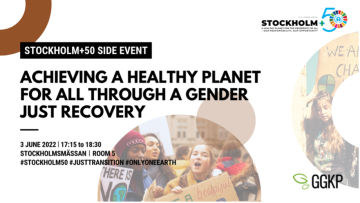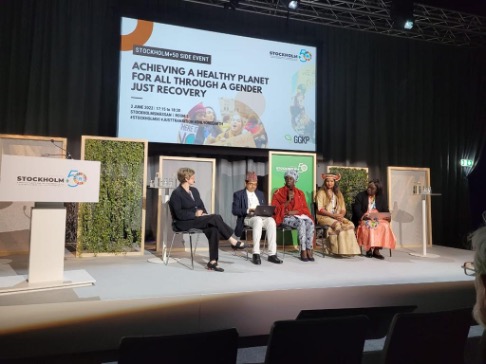
On the 3rd of June 2022, the GGKP Gender Expert Group held the Stockholm+50 Official Side Event, Achieving a Healthy Planet for all Through a Gender-Just Recovery.
The event convened activists, leaders and thinkers contributing to the global agenda towards an inclusive and sustainable transition. Speakers included Sarah Hendriks, Director of the Programme, Policy and Intergovernmental Division at UN Women; Madeleine Diouf Sarr UNFCCC LDC Chair; Dr. Saleemul Huq Director of the International Centrer for Climate Change and Development; Bhavna Choudhury Founder of The Indigenous; Sheila Oparaocha Director of ENERGIA International Network on Gender and Sustainable Energy and Dr. Pem Narayan Kandel, Secretary, Ministry of Forestry and Environment, Nepal. The event was moderated by Ingvild Solvang, Deputy Director and Head of Climate Action and Inclusive Development, Global Green Growth Institute.
This event aimed to explore why gender equality needs to be a central component of global environmental action and to the ambitions of a better post-COVID world. It spotlighted the opportunities and limitations of our current just transition models, and further highlighted how gender transformative approaches help in fulfilling our commitment to combating the three planetary crises.

What were the outcomes?
Discussions took place around the role of donors, the private sector, and governments in prioritizing and increasing gender-responsive financing to empower women, youth, indigenous peoples, and other disadvantaged groups.
“Our plan for recovery and our plans for sustainability must be feminist, and they must promote social justice. The UN Women Plan for Sustainability, Social Justice and Recovery prioritizes focus on jobs, care and climate action, as three essential pillars towards achieving gender just recovery. Furthermore, the ways of achieving this must foster democracy, social and global justice” said Sarah Hendriks, UN Women.
Furthermore, the event highlighted how a culture of systemic reform and transformation at the national level is much needed. This would be achieved by supporting institutional changes through actions including improved policy legal frameworks and gender responsive budgeting as well as shifting gender norms and enhancing decision making opportunities for communities and the disadvantaged.
Dr. Saleemul Huq, Director, ICCCAD said “Our current governance systems designed to tackle the planetary crisis and ensure just transtions are failing us. We need new ways to face the challenges that allow the voices of youth, indigenous peoples, women and least developed countries to be heard.”
Moreover, actions needed to achieve the 2030 Agenda and a gender just transition will not be reached by working in silos and resources have to be pooled through strategic and effective partnerships and collaborations in order to achieve gender just goals.
Finally, it is necessary to facilitate opportunities for education and capacity building for members of disadvantaged communities so that people have access to the information they need to advocate for themselves at the national and international levels – especially in meaningful political leadership positions and participating in decision making.
Taking action for a global gender just transition:
The GGKP Gender Expert Group provides research, capacity building and knowledge sharing to aid evidence-based policy development processes, specifically on integrating gender equality and women’s empowerment in green growth approaches. It is a collaboration between leading green growth and green economy institutions influencing future interventions by identifying and responding to knowledge gaps for a gender-just green transition. In its first phase, the group has produced three knowledge products to provide a framework to: assess gender equality impacts of green growth and just transitions across sectors dominated by informal value chains and markets; unpack the scope for financing gender equality in just transitions; and identify entry points for powering a gender-just transition to net zero. Please find here a summary of the gender & energy work.
To receive more information about the group please contact [email protected].
To further engage on the role of gender equality in the green transition, please register on the Green Forum and share your thoughts on the Gender discussion.
Please find below the full recording of the event:
